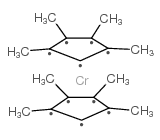82066-37-3
| 中文名 | 二(四甲基环戊二烯基)铬(II) |
|---|---|
| 英文名 | bis(tetramethylcyclopentadienyl)chromium |
| 中文别名 |
双(四甲基环戊二烯)铬
双(四甲基环戊二烯)铬(II) |
| 英文别名 |
MFCD01862451
Bis(tetramethylcyclopentadienyl)chromium(II) 1,1',2,2',3,3',4,4'-Octamethylchromocene Bis(tetramethylcyclopentadienyl)chromium,min. |
| 熔点 | 106-111ºC (dec.)(lit.) |
|---|---|
| 分子式 | C18H26Cr |
| 分子量 | 294.39500 |
| 精确质量 | 294.14400 |
| LogP | 5.16380 |
| 外观性状 | 暗红色晶体 |
| 储存条件 | 2-8°C冷藏、密闭、干燥处 |
| 稳定性 | 按规定使用和贮存的不会分解,避氧化物、空气、水分 |
| 更多 | 1. 性状:暗红色结晶 2. 密度(g/mL25 ºC):未确定 3. 相对蒸汽密度(g/mL,空气=1):未确定 4. 熔点(ºC):106-111 5. 沸点(ºC, 常压):未确定 6. 沸点(ºC0.35mmHg):未确定 7. 折射率:未确定 8. 闪点(ºC):未确定 9. 比旋光度(º):未确定 10. 自燃点或引燃温度(ºC):未确定 11. 蒸气压(kPa,):未确定 12. 饱和蒸气压(kPa,60ºC):未确定 13. 燃烧热(KJ/mol):未确定 14. 临界温度(ºC):未确定 15. 临界压力(KPa):未确定 16. 油水(正辛醇/水)分配系数的对数值:未确定 17. 爆炸上限(%,V/V):未确定 18. 爆炸下限(%,V/V):未确定 19. 溶解性:未确定 |
|
Section 1: Product Identification Chemical Name:Bis(tetramethylcyclopentadienyl)chromium, min. 98% CAS Registry Number:82066-37-3 Formula:[(CH3)4C5H]2Cr EINECS Number:none Chemical Family:metallocene Synonym:1,1',2,2',3,3',4,4'-Octamethylchromocene
Section 2: Composition and Information on Ingredients IngredientCAS NumberPercentACGIH (TWA)OSHA (PEL) Title compound82066-37-3100%0.5mg/m3 (as Cr)0.5mg/m3 (as Cr) Section 3: Hazards Identification May be irritating to eyes, skin and respiratory tract. Chromium (III), a possible metabolite, has acted as a Emergency Overview: tumorigen and mutagen in animal studies. Primary Routes of Exposure:Ingestion, inhalation of dust. Eye Contact:May cause slight to mild irritation of the eyes Skin Contact:May cause slight to mild irritation of the skin. Inhalation:May be irritating to the nose, mucous membranes and respiratory tract. Ingestion:No information on the physiological effects of ingestion of this specific compound. Acute Health Affects:May be irritating to skin, eyes and respiratory tract. It is possible that prolonged exposure could result in formation of Chromium (III) salts in the human body. Chronic Health Affects:Although less toxic than Chromium (VI), some animal studies show Chromium (III) to act as a mutagen and tumorigen. NTP:Yes IARC:No OSHA:No SECTION 4: First Aid Measures Immediately flush the eyes with copious amounts of water for at least 10-15 minutes. A victim may need Eye Exposure: assistance in keeping their eye lids open. Get immediate medical attention. Wash the affected area with water. Remove contaminated clothes if necessary. Seek medical assistance if Skin Exposure: irritation persists. Remove the victim to fresh air. Closely monitor the victim for signs of respiratory problems, such as difficulty Inhalation: in breathing, coughing, wheezing, or pain. In such cases seek immediate medical assistance. Seek medical attention immediately. Keep the victim calm. Give the victim water (only if conscious). Induce Ingestion: vomiting only if directed by medical personnel. SECTION 5: Fire Fighting Measures Flash Point:none Autoignition Temperature:none Explosion Limits:none Extinguishing Medium:carbon dioxide, foam or dry powder If this product is involved in a fire, fire fighters should be equipped with a NIOSH approved positive pressure Special Fire Fighting Procedures: self-contained breathing apparatus and full protective clothing. Hazardous Combustion andIf involved in a fire this material may emit irritating and toxic fumes. Decomposion Products: Unusual Fire or Explosion Hazards: Flammable solid. SECTION 6: Accidental Release Measures Spill and Leak Procedures:Small spills can be mixed with vermiculite or sodium carbonate and swept up. SECTION 7: Handling and Storage Store in a tightly sealed container. Handle and store under an inert atmosphere of nitrogen or argon. Handling and Storage: Exposure to air may result in degradation of the product. SECTION 8: Exposure Controls and Personal Protection Eye Protection:Always wear approved safety glasses when handling a chemical substance in the laboratory. Skin Protection:Wear protective clothing and gloves. Ventilation:Material may form a fine dust. If possible, handle the material in an efficient fume hood. If in form of fine dust and ventilation is not available a respirator should be worn. The use of respirators Respirator: requires a Respirator Protection Program to be in compliance with 29 CFR 1910.134. Ventilation:Material may form a fine dust. If possible, handle the material in an efficient fume hood. Additional Protection:No additional protection required. SECTION 9: Physical and Chemical Properties Color and Form:red xtl. Molecular Weight:294.40 Melting Point:no data Boiling Point:no data Vapor Pressure:no data Specific Gravity:no data Odor:none Solubility in Water:insoluble SECTION 10: Stability and Reactivity Stability:air sensitive solid Hazardous Polymerization:none Contact with oxygen. Keep away from heat and ignition sources including open flame and electrostatic Conditions to Avoid: discharge. Incompatibility:strong oxidizing agents Decomposition Products:carbon dioxide, carbon monoxide, organic fumes and chromium oxide. SECTION 11: Toxicological Information RTECS Data:No information available from the RTECS files. Carcinogenic Effects:No data available Mutagenic Effects:No data available Tetratogenic Effects:No data available SECTION 12: Ecological Information Ecological Information:No information available SECTION 13: Disposal Considerations Disposal:Dispose of according to local, state and federal regulations. SECTION 14: Transportation Shipping Name (CFR):Flammable solids, Organic, N.O.S. Hazard Class (CFR):4.1 Additional Hazard Class (CFR):NA Packaging Group (CFR):II UN ID Number (CFR):UN# 1325 Shipping Name (IATA):Flammable solid, Organic, N.O.S. Hazard Class (IATA):4.1 Additional Hazard Class (IATA):NA Packaging Group (IATA):II UN ID Number (IATA):UN# 1325 SECTION 15: Regulatory Information TSCA:not listed on the TSCA inventory SARA (Title 313):Title compound: see Category Code N090 for reporting Second Ingredient:none SECTION 16 - ADDITIONAL INFORMATION N/A |


